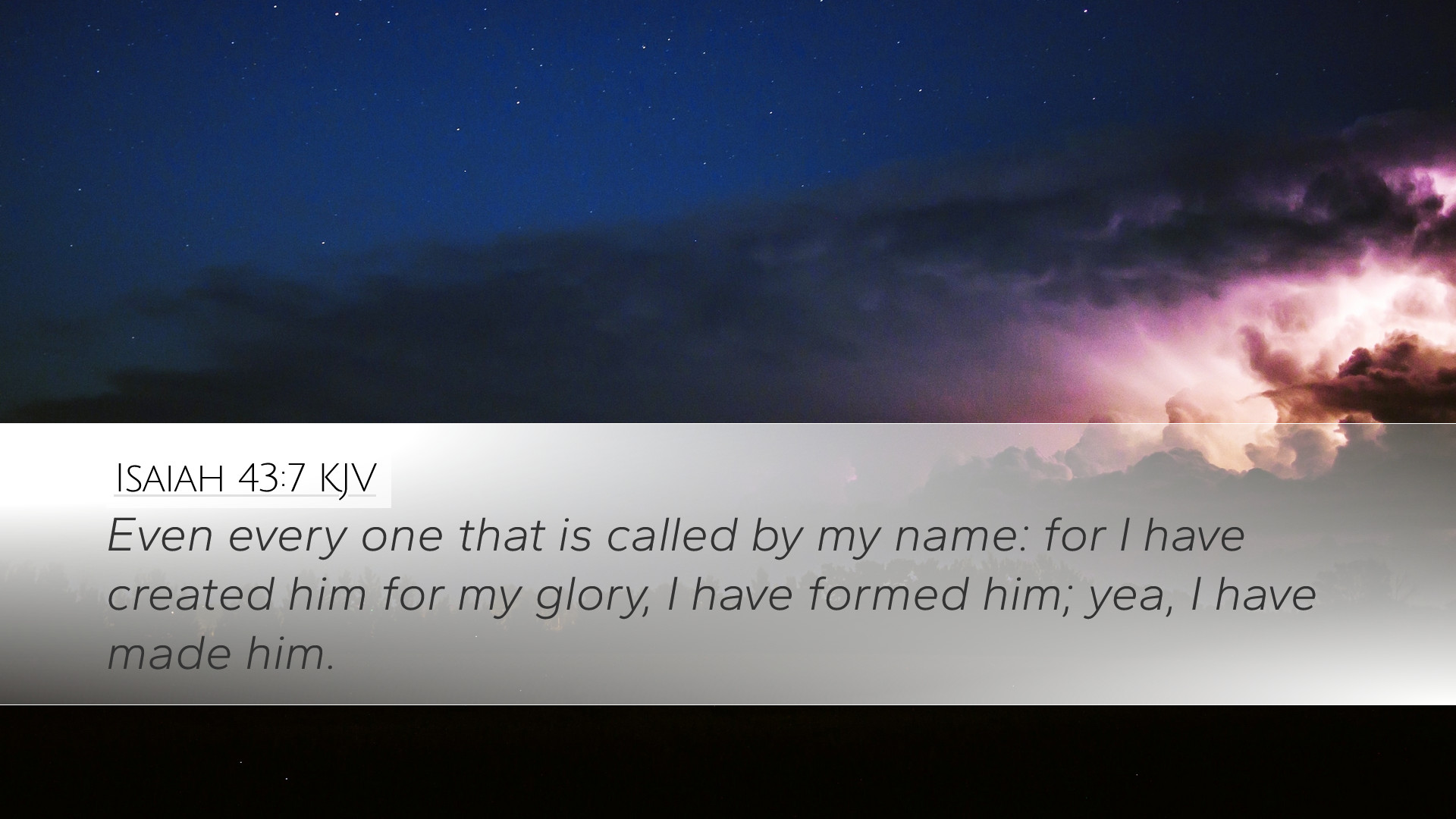Bible Commentary on Isaiah 43:7
Verse Reference: Isaiah 43:7 - “Even every one that is called by my name: for I have created him for my glory, I have formed him; yea, I have made him.”
Introduction
This verse from the book of Isaiah encapsulates a profound theological truth regarding God's purpose in creation. It reflects the relationship between humanity and the divine calling, emphasizing that all who carry God's name are created for a distinct purpose—that of glorifying Him. This commentary combines insights from several notable public domain sources to offer a comprehensive understanding of this verse for pastors, students, theologians, and scholars.
Theological Context
Isaiah 43 stands as a pivotal chapter in which God reassures His people of His unwavering love and faithfulness despite their transgressions. The backdrop is the Babylonian exile, a period marked by despair and longing for restoration. In this context, the emphasis on being called by God’s name signifies a deep personal and communal identity.
Matthew Henry's Commentary
Matthew Henry articulates that this verse denotes a Divine choice—a calling that brings dignity and significance to those who are regarded as God's own. He underscores the societal and spiritual implications of being "called by my name," signifying their identity as a people set apart for the Lord. It is a reminder of the covenant relationship established with the Israelites, which is extended to all who believe.
Creation for Glory
Henry emphasizes the notion that being created for God's glory is the ultimate purpose of humanity. This aligns with the broader biblical theme that all of creation reveals God's glory (Psalm 19:1). The implication is that every action and intention of humanity should aim to reflect that glory, thus fulfilling their created purpose.
Albert Barnes' Commentary
Albert Barnes deepens the discussion around the inclusive nature of God’s calling. He highlights that “every one that is called by my name” indicates not just the Israelites but extends to all individuals who embrace God’s calling. This principle resonates with New Testament teaching where Gentiles are equally invited into the fellowship of believers.
God's Sovereign Will
Barnes points out that the creation and formation mentioned in this verse suggest God's sovereignty over human life. It reflects an active engagement where God shapes individuals not only in a physical sense but also in purpose—according to His divine will for glory. In this light, human existence acquires an eternal significance rooted in God’s grand narrative.
Adam Clarke's Commentary
Adam Clarke adds a rich layer of insight by interpreting “for I have created him for my glory” as a mission statement for all of humanity. He provides a theological reflection where each individual bears the responsibility to glorify God through their lives, creativity, and endeavors. Clarke stresses that this call is intrinsic to human nature, and thus, deviating from it results in an existential void.
The Nature of Glory
Clarke elucidates the notion of glory in a personal and communal context, indicating that while God is inherently glorious, He invites humanity to partake in that glory. This serves both as a privilege and a solemn responsibility to embody divine attributes—holiness, love, justice, and mercy—mirroring the character of God in their daily lives.
Practical Applications
This verse holds significant implications for contemporary believers and church leaders. The idea of being created for God's glory provides a framework for understanding one's life purpose:
- Identity in Christ: Recognizing one's identity as called by God leads to a transformation of self-perception, instilling a sense of value and belonging.
- Purpose-driven Living: Every action, decision, and relationship can be viewed as an opportunity for reflection of God’s glory, fostering a lifestyle oriented toward worship.
- Community of Believers: The call extends to the church collectively, positioning believers as a united body tasked with the mission of glorifying God through communal actions and outreach.
Conclusion
Isaiah 43:7 serves as a powerful reminder of God’s intentionality in creation, affirming that every individual called by His name has purpose and responsibility. The insights from Matthew Henry, Albert Barnes, and Adam Clarke enrich our understanding of this verse, emphasizing identity, divine sovereignty, and the call to glorify God in all aspects of life. It challenges us to reflect on how we can live as instruments of His glory in our communities and beyond.


